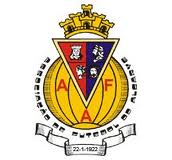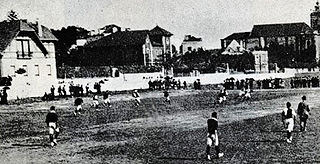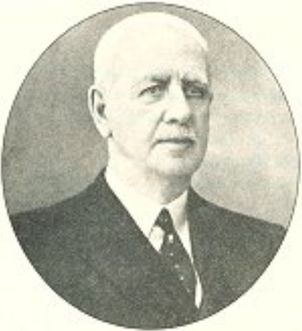
Sport Lisboa e Benfica, commonly known as Benfica, is a professional football club based in Lisbon, Portugal, that competes in the Primeira Liga, the top flight of Portuguese football.

The Associação de Futebol do Algarve is one of the 22 district football associations that are affiliated to the Portuguese Football Federation. The AF Algarve administers lower tier football in the district of Faro.

Casa Pia Atlético Clube is a Portuguese multi-sports club founded in 1920 and based in Lisbon, Portugal, best known for its professional football team, that competes in the Primeira Liga. The club is named after Casa Pia, a Portuguese children's charity, and many of its athletes come from that institution. Its football stadium is Estádio Pina Manique, named in honor of Pina Manique, the founder of Casa Pia children's charity. Casa Pia AC was one of the most versatile Portuguese clubs, having played 25 sports, with the curiosity of having been the only one who practiced Baseball regularly, beating the strong team of the American Colony on 4 July 1923 at Campo das Laranjeiras by 25–24.

Association football, the most popular sport in Portugal, has a long and storied history in the country, following its introduction in 1875 in cities such as Funchal, Lisbon, Porto and Coimbra by English merchants and Portuguese students arriving back home from studying in England. This led to the establishment of local clubs dedicated to the practice of the sport.
The 1906–07 season was Sport Lisboa e Benfica's third season in existence and the club's first competitive season, still under the name Sport Lisboa.
The 1907–08 season was Sport Lisboa e Benfica's third season in existence and the club's second competitive season, still under the name Sport Lisboa.
The 1908–09 season was Sport Lisboa e Benfica's fifth season in existence and the club's third competitive season.
The 1909–10 season was Sport Lisboa e Benfica's sixth season in existence and the club's fourth competitive season. Benfica won their first and regional title, the Campeonato de Lisboa.
The 1941–42 Taça de Portugal was the fourth season of the Taça de Portugal, the premier Portuguese football knockout competition, organized by the Portuguese Football Federation (FPF). Sporting Clube de Portugal was the defending champion but lost in the semi-finals to Vitória Sport Clube. The final was played on 12 June 1942 between Clube de Futebol Os Belenenses and Vitória Sport Clube.
The 1943–44 Taça de Portugal was the sixth season of the Taça de Portugal, the premier Portuguese football knockout competition, organized by the Portuguese Football Federation (FPF). Benfica was the defending champion and played Estoril in the final on 28 May 1944.
The 1944–45 Taça de Portugal was the seventh season of the Taça de Portugal, the premier Portuguese football knockout competition, organized by the Portuguese Football Federation (FPF). Benfica was the defending champion but lost in the semi-finals to Sporting Clube de Portugal. The final was played on 1 July 1945 between Sporting Clube de Portugal and Sporting Clube Olhanense.

Campo da Feiteira was a football dirt field in Lisbon, Portugal. It started as field for Grupo Sport de Benfica to organize Sports Festivals. On 26 May 1907, Grupo Sport de Benfica officially taken over of Quinta da Feiteira, next to Estrada de Benfica, having from now on, a 120 meters per 79 metres field, for $20 a semester. On 14 July 1907 it celebrated here, the first anniversary of Grupo Sport de Benfica.

Guilherme Ferreira Pinto Basto was a Portuguese all-round sportsman and entrepreneur. He is considered to have been the pioneer of both football and tennis in Portugal, playing in the first recorded football match and winning the national tennis championships on nine occasions.
Foot-Ball Club Lisbonense, better known as Club Lisbonense, was a football team based in Lisbon, Portugal, which existed between 1892 and 1902. Lisbonense played a crucial role in the amateur beginnings of football in Portugal, being the very first football club in the capital, winning the first football ‘cup’ in the country on 2 March 1894 and then being at the roots of the foundation of the Club Internacional de Foot-ball. Their equipment was blue.
Eduardo Pinto Basto was a Portuguese football pioneer who is regarded as one of the most important figures in the amateur beginnings of football in Portugal. He had a pivotal and prominent role in promoting this sport in Portugal and particularly in Lisbon when he ordered a series of footballs from England, which he distributed to various military units, thus giving a huge boost to the practice of this sport. Together with his brothers Guilherme and Frederico, he was the fundamental head behind the foundations of some of the earliest clubs in the city such as Club Lisbonense (1892) and Club Internacional de Foot-ball (1902), serving both teams as a forward. The dates of his birth and death are unknown.

António Nicolau de Almeida was a Portuguese football executive, who founded FC Porto on 28 September 1893 and then served as its first president until 1896, when he gave up from the club at the request of his wife.
The Taça D. Carlos I was a friendly football tournament that was held only once, in Campo Alegre, Porto, on 2 March 1894. That match was contested by representative teams of Lisbon and Porto, and ended in a 1–0 win to the Lisbonenses, but most important than the result was its historical significance, as it was the first major football event in Portugal as well as the first football ‘cup’ played on the Iberian Peninsula. Moreover, the Taça D. Carlos I was the first domestic match between those two cities.

The first football match in mainland Portugal took place in Campo Pequeno, Lisboa on 22 January 1889. Three months earlier, in October 1888, a test match had already been held in Cascais contested between members of the Sporting Club of Cascais, one of the first clubs dedicated to football in Portugal. However, the one held in January was the first proper match in Portuguese football history, since the pitch had markings and goalposts, and the match followed the rules and lasted 90 minutes. It was also more competitive because the match was contested between Portuguese noblemen and a group of English workers living in Portugal, and thus it can be considered as one of the first ‘international’ matches in the history of the sport. Furthermore, the one held in January was a public event, and Lisbon's high society turned out in force to see what the game was like. Both games were held at the initiative of Guilherme Pinto Basto, one of the members of Cascais club.
Frederico Tomás Ferreira Pinto Basto was a Portuguese football pioneer who is regarded as one of the most important figures in the amateur beginnings of football in Portugal. He is best known for playing in the first football match in mainland Portugal in Cascais in October 1888, and for then playing for a Portuguese team on 22 January 1889, against a team made-up British in Lisbon. Together with his brothers Guilherme and Eduardo, he was the fundamental head behind the foundations of some of the earliest clubs in the city such as Club Lisbonense (1892) and Club Internacional de Foot-ball (1902), serving both teams as a forward. He was also the owner of Casa das Gaeiras.
Carlos Augusto Paiva Raposo Vilar was a Portuguese naval officer and a pioneer of football in Portugal.








